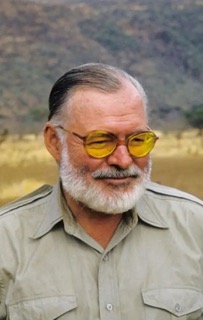About The Author: Ernest Hemingway
Ernest Hemingway, a towering figure in the literary world, remains an indomitable presence celebrated for his unique prose style and profound understanding of the human experience.
His succinct and impactful writing has left an indelible mark on 20th-century literature, influencing generations of writers and readers alike.

Ernest Hemingway's succinct and impactful writing has left an indelible mark on 20th-century literature.
Table of Contents
About the Author Notable Works Early Life Career Later life Reputation Awards Works NotesErnest Hemingway: Notable Works
Hemingway’s literary canon encompasses classics such as:
- The Sun Also Rises (1926): Lost generation seeks purpose amidst post-WWI disillusionment in Europe.
- A Farewell to Arms (1929): Love and tragedy in the midst of World War I.
- Death in the Afternoon (1932): Bullfighting exploration blending art, culture, and personal experiences.
- Winner Take Nothing (1933): Short stories delve into human struggles and relationships.
- Green Hills of Africa (1935): Safari reflections intertwine hunting, nature, and literary musings.
- To Have and Have Not (1937): A down-on-his-luck fisherman becomes entangled in smuggling.
- The Fifth Column and the First Forty-Nine Stories (1938): War stories mixed with varied fictional narratives.
- For Whom the Bell Tolls (1940): American volunteer fights in Spanish Civil War, confronts mortality.
- Men Without Women (1927): Short stories contemplate masculinity, isolation, and the complexities of life.
- Across the River and Into the Trees (1950): Aging colonel reflects on love and death in postwar Venice.
- The Old Man and the Sea (1952): A Cuban fisherman’s epic battle against a marlin.
- A Moveable Feast (1964): Memoir captures Hemingway’s Parisian life and artistic companionship.
- Islands in the Stream (1970): Three-part novel explores family, friendship, and war’s impact.
- The Garden of Eden (1986): Unfinished novel examines marital complexities and gender identity exploration.
- True at First Light (1999): Semi-autobiographical African journey delves into writing process and relationships.
This list includes most of Hemingway’s major published works, but there might be some smaller or lesser-known pieces that are not included.
Ernest Hemingway: Early Life
Hemingway’s formative years were heavily influenced by his father’s medical practice and a love for outdoor activities, which imbued him with a rugged spirit.
His early experiences as a journalist during high school sparked his passion for writing and storytelling.
Ernest Hemingway: Career
Hemingway’s literary journey blossomed in the vibrant artistic scene of 1920s Paris, where he joined fellow expatriate writers.
His debut novel, “The Sun Also Rises,” unveiled his stripped-down prose style and introduced readers to his “Iceberg Theory” of storytelling—where more remains unsaid than is explicitly stated.
Ernest Hemingway: Later life
The latter part of Hemingway’s life was marked by personal struggles, including battles with depression.
Nevertheless, he continued to contribute enduring works like “For Whom the Bell Tolls” and “The Old Man and the Sea,” which won him the Pulitzer Prize in 1953.
Ernest Hemingway: Reputation
Hemingway’s reputation as a literary giant hinges on his unparalleled ability to convey complex emotions and ideas with economical language. His exploration of themes like courage, love, and existential angst resonates with readers on a deeply human level.

Ernest Hemingway's literary prowess earned him the Nobel Prize in Literature in 1954
Ernest Hemingway: Awards
Ernest Hemingway’s literary prowess earned him the Nobel Prize in Literature in 1954, a recognition of his mastery in narrative art and his profound influence on modern writing.
Ernest Hemingway: Works
Hemingway’s literary repertoire includes classics like “To Have and Have Not,” a gripping novel set in the Caribbean; “A Moveable Feast,” a memoir of his Paris years; and a treasury of short stories that showcase his skill in crafting emotionally charged vignettes.
Notes:
Hemingway’s legacy extends beyond his written words. His larger-than-life persona, his friendships with luminaries like F. Scott Fitzgerald, and his lasting impact on literary craftsmanship have solidified his place as an enduring literary legend.
